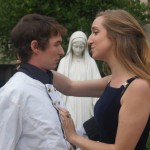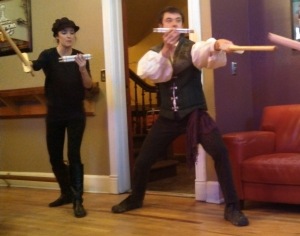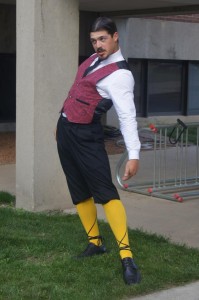Written by Jared McDaris
SPOILERS AHEAD!
Twelfth Night was written in the opening years of the 17th Century, near the end of the reign of Queen Elizabeth I. While her sister and predecessor, Queen Mary I, had been both Catholic and violently anti-Protestant, Elizabeth was a Protestant and (perhaps paradoxically) far more tolerant of papal followers. Elizabeth believed that Catholics should be allowed to follow their own faith (relatively) openly, so long as it did not interfere with the peace. This of course did not stop the occasional persecution from other figures both public and private, but it was generally an era less bloody than Mary’s.
However, Twelfth Night was written near the end of Elizabeth’s reign, long after the death of Mary, Queen of Scots. This second Mary was a figurehead-champion (both willing and unwilling) of numerous Catholic plots (small and large, hypothetical and genuine) to retake the crown from the Protestant Elizabeth. Put simply, the religious freedom endorsed by Elizabeth I was, although presumably more liberal than her predecessor, a shadow of the freedom we enjoy today.
So the Twelfth Night Catholic Conspiracy is, by a wide margin, not the most ridiculous conspiracy theory linked to Shakespeare (witness the continually debunked and continually resuscitated Anti-Stratfordian movement).
In essence, the idea is this: Twelfth Night was written as a semi-covert celebration of Catholicism and a barely disguised mockery of Protestantism. At the time, British Catholicism was the sect associated with celebration, festivity, and casual liberality. Conversely, Protestantism was against excessive celebration, idolatry, and most tellingly: saint-worship (which they viewed as pagan), even going so far as to call Catholicism the “Cult of Mary” for their veneration of the Virgin Mary.
I know. There’s a lot of Marys.

So what’s so Catholic about Twelfth Night? To begin with, it’s named after a holiday. Protestantism was the more puritanical of the two sects (this will come up again later), generally opposed to holidays (also considered a pagan concept) and festivity. Moreover, Twelfth Night features an unusually large number of characters named after Catholic saints: Andrew, Antonio (Anthony), Sebastian, Valentine, even Maria (another name for the Virgin Mary). All of these names can be found in other Shakespearean plays, but only in Twelfth Night are they all together. It’s also worth noting that Olivia is called Madonna several times (also a reference to the Virgin Mary).
Speaking of names: I am hardly the first to point out that Viola, Olivia, and Malvolio all have the word “lov” mixed into their names (“lov” being an easy misspelling of “love” in the earliest days of Modern English, when it was entirely commonplace for words to have several different spellings). “Viola” is presumably a reference to the musicality of love (Twelfth Night has a lot of music, and many references to music), “Olivia” perhaps alludes to the peaceful or peace-making qualities of love (kind of ironic, given her mercurial nature for most of the play). “Malvolio,” meanwhile, means ‘bad love.’ Olivia herself says of him, “you are sick of self-love.” Malvolio, then, is the Duessa to Olivia’s Una (or Viola’s Una, if you prefer).
And what do we know about Malvolio? He is called prideful, a poseur, pompous, vain, easily deceived. He is called something of a puritan, is accused of practicing formalities to his own shadow, and most intriguingly: he is several times insulted with terms typically used to insult a “loose” woman. Almost all these terms could easily be applied to Duessa, Spenser’s spokeswoman for the ‘False Church’ in his epic The Fairie Queene. Of course, Spenser’s false church was the Catholic church, and here the false church is Protestantism, but all the same: the symbolism is powerful. Malvolio is a puritan who hates celebration, has pretensions above his rank, tells Maria how to behave, and presumes to speak for Olivia, the Madonna.
Although Viola is clearly the romantic lead of this piece, and Sir Toby is the largest role and (intended) fan favorite, it’s Malvolio who has commanded the most attention historically (King James, in his copy of Shakespeare’s works, crossed out “Twelfth Night” in the table of contents and wrote “Malvolio” in its place). Maria and Feste’s deception and abuse of Malvolio are the clear comedic center of the play. So we see the Puritan (whom Sir Andrew boasts to beat “like a dog”), duped and made a fool by Maria, then abused and driven mad by Feste the Jester: festival in human form and the musical (and ritual) emcee of the play.


Taken in this light, Twelfth Night seems to be a merry ribbing of the dominant belief-system, and a good-natured celebration of celebration itself. But with Shakespeare, things are never that simple (except in Comedy of Errors, of course).
A quick look at these Catholic namesakes reveals a less than flattering picture of the sect Shakespeare is championing.

Antonio, by turns portrayed as the avuncular guardian of Sebastian or more often (and more successfully, I’d argue) as the boy’s enamored admirer, is shunted aside by Sebastian the instant Olivia presents herself. Saint Anthony is the patron saint of finding lost things (and people), which is exactly what Antonio does: he rescues the drowning Sebastian and expects nothing in return. He gives the young man money to buy himself trinkets and even risks venture into Illyria; Antonio is an enemy of the state and likely to suffer dearly if seen. Whether Antonio is genuinely in love with Sebastian or just a kindly older man, his sacrifices and his risks are ultimately rewarded with nothing: Sebastian offers him a single kind word in 5.1, and Antonio is forgotten for the rest of the show.

Andrew Aguecheek is a clown and a dope of the first order. No doubt played by John Sinklo, a Shakespearean actor know for his bony physique and sickly pallor, Andrew is portrayed either as a wan-looking wimp or a flamboyant fool (sometimes both). Most interesting is his sacrilegious oaths (he swears by God’s eyelid at one point) and his utter inability to comprehend Latin. This is particularly interesting: one of the major points of contention between Catholicism and Protestantism was Latin. Catholics insisted that the Bible (and all readings therefrom) should be in Latin, as they had been for over one thousand years. Protestants argued that the Bible should be written in ‘the Vulgate,’ so everyone could understand it. Andrew the knight’s complete ignorance of it and Feste’s presumably deliberate mangling of it show a less than holy respect for the traditionally biblical tongue. And let’s not forget that Andrew is also a braggart, a prodigal, and a clueless coward, ultimately no better than Malvolio, save for his love of festivity (if that’s a virtue).
Valentine is a minor role, but even he has one or two intriguing lines. When the Duke asks if his words of love were delivered to Olivia, Valentine replies:
“So please my Lord, I might not be admitted,
But from her handmaid do returne this answer:
The Element it selfe, till seven yeares heate,
Shall not behold her face at ample view:
But like a Cloystresse she will vailed walke,
And water once a day her Chamber round
With eye-offending brine: all this to season
A brothers dead loue, which she would keepe fresh
And lasting, in her sad remembrance.”
(italics mine)
In order for the Scansion to work (if you’re interested in that sort of thing), Valentine must say “vail-ed,” not “vailed,” and even more interesting: “remem-berance,” not “rememb’rance.” Even more, why does Valentine need to say “The Element itself, ’til seven years heat / Shall not behold her face at ample view,” rather than simply “She’ll see no one for seven years,” or instead of “And water once a day her Chamber round / With eye-offending brine,” why not simply “She’ll weep once per day for her brother’s love.” There are absolutely many ways to interpret this, but one such interpretation is that Valentine is more than a little stuffy, more than a little pompous himself. Such stretched out fancy-talk is not uncommon in Shakespeare, but slightly unusual for a mere messenger. And why does Valentine, an incidental messenger, even have a name? He is a courtier, and has a handful of lines in 1.4, but again that hardly justifies such fanciness. It’s a weak argument, but only one among several stronger.
Maria is a gentlewoman, or so called, but she behaves little better than the coarse knights Toby and Andrew. She is both cunning and cruel, demands the same quiet that Malvolio does, and visits cruel deception and vengeance upon the Puritan, ostensibly for nothing more than a casual chastisement that she aught to discipline the rowdies more effectively.
We are led to believe that Malvolio couldn’t have fallen for Maria’s tricks if he weren’t so pompous, so vain, but how do we know he’s so vain? Everyone says so, especially Maria, but all his behavior in Acts 1 and 2 are at the behest of Olivia. Olivia demands quiet, so he demands it. Olivia demands harsh treatment of Orsino’s messengers, so he is rude to Caesario. Maria does exactly the same: she demands quiet of Toby and Andrew, mocks Feste and tells him to behave himself, and is rude and dismissive of Caesario. Yet Maria is ‘clever’ and Malvolio is ‘foolish.’ If talking to no one (“practicing behaviors to his own shadow”) is a sign of vanity, then every Shakespearean lead is far vainer than Malvolio, including Orsino and Viola.

So what are Malvolio the Puritan’s crimes? He mocks Feste, just as Olivia does. He is rude to servants and demands quiet, just like Maria. His overt pomposity, his clear claims of superiority, don’t show up until Olivia’s (fake) letter tells him to be dismissive and superior. In fact, when he first enters in 2.5, he is already fantasizing about Olivia, wondering if she might have feelings for him. Malvolio is easily duped, not because he is vain, but because he is desperate for Olivia’s love. Sure, he daydreams of talking down to Sir Toby, but who hasn’t had the same thoughts about a belligerent and drunken superior? Any other alleged crimes are only spoken, not proven. And for that, he is imprisoned and abused, humiliated and terrified, nearly driven mad, deposed and replaced in favor (if he ever had favor) by the pretty and vacant Sebastian. And when all’s said and done, we’re treated by Feste to another beautiful song with a strong hint of melancholy: “For the rain, it raineth every day.”

So what does Twelfth Night really say about religion, and about festival? More than anything else, it says that Shakespeare was wise enough to keep his political opinions (if he had any) well hidden behind three-dimensional speakers. Incredibly, this play also features the same terribly tasteless jokes (one of Viola’s most beautiful speeches may well contain a seemingly-random bit of scatological humor), the same vapid fools, and (if Unrehearsed theory is right) the same cartoonish gesticulations, as any other Shakespearean comedy. And like every other comedy, it still has a volume of commentary on the zeitgeist and human nature as a whole. Even the Bard’s simplest, most cartoonish comedies still offer a wealth of insight about our species.
Except for Comedy of Errors.
HEY! Be sure and check out our third annual Twelfth Night on Twelfth Night.
TWELFTH NIGHT ON TWELFTH NIGHT
January 5th (Twelfth Night) and January 12th (the twelfth night… of January)
Blackrock Pub, 3614 N Damen Ave
Doors open at 7:00, show starts at 7:30
$5 at the door
Come be something great… the Audience!

